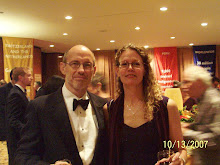I agree with Bruce Fein.
Washington Times
October 2, 2007
Pg. 14
Seeing The Caskets
By Bruce Fein
Members of Congress aim to enrich understanding of the Iraqi war. They would enact legislation to substitute sunshine for the prevailing Defense Department photo blackout of soldiers' coffins on their journeys back to the United States. One picture is worth 1,000 words.
The eye more effectively pricks the soul and stirs the conscience than volumes of philosophy. During the Vietnam War, the photo of a Vietnamese child's terror while engulfed in flames underscored the human cost of the conflict. Photos of flag-draped coffins returning from Iraq would similarly concentrate the minds of the public and Congress on the steep price of persisting militarily in Iraq for the sake of persistence, just as photos of the September 11 abominations correctly focus attention on the terrorist danger. Photos of coffins are surrogates for numerators in the Iraqi war equation. When they become larger than the war's denominators, the public may come to clamor for an end to aimless American deaths.
The Pentagon's blackout policy was initiated in 1991, ostensibly to protect the privacy of grieving families. But the caskets do not identify the names of the dead. They are like a statue celebrating the Unknown Soldier. The proposed legislation might propely limit photographing of coffins to bona fide news organizations. The government should not be a party to commercializing war tragedies. But the idea that a photo of a flag-draped coffin, simpliciter, encroaches on privacy is unconvincing.
Victoria Clark, a former Pentagon spokeswoman, explained her disagreement with the photo ban to CNN: "I happen to believe that people should be allowed to cover those events. I think if you are going to sign pieces of paper saying young people are going to put their lives at risk, that young people are going to die for important causes, then we should be willing to let people see what happens and the kinds of terrible things that can happen in conflict. I think that is being very straight with the American people."
The need to remind Americans that war entails sacrifices is exceptionally urgent regarding Iraq and Afghanistan. The vast majority of citizens are unaffected by those conflicts. In contrast to Vietnam, there is no draft. In contrast to World War II, there are no victory gardens or meatless Fridays. And the staggering expense of the wars has been shifted to future generations by equally staggering budget deficits.
Virtually the entire burden of the wars is borne by a relatively small circle of military families. But the votes of the vastly greater number of unaffected citizens dictate the views of Congress. Human nature inclines them toward complacency with the post-Saddam quagmire since they are neither pinched nor discommoded.
Photos of the coffins of returning soldiers would spur voters to think more seriously about U.S. policy in Iraq just as a visit to the Holocaust Museum awakens more sober thinking about genocide.
The authority for the proposed legislation is at least twofold. The First Amendment's protection of freedom of expression does not saddle the government with a duty to make available to journalists sources of information not available to the public generally. The United States Supreme Court further elaborated in Houchins v. KQED (1978) that, "There is no constitutional right to have access to particular government information, or to require openness from the bureaucracy. The public's interest in knowing about its government is protected by the guarantee of a Free Press, but the protection is indirect. The Constitution itself is neither a Freedom of Information Act nor an Official Secrets Act." The court added, however, that Congress could ordain openness through carefully drawn legislation.
The Constitution also entrusts to Congress the "regulation of the land and naval forces." That power includes stipulations for the treatment and publicity provided to soldiers who have given that last full measure of devotion.
The legislation contemplated by members of Congress would not purport to tell the whole story about the Iraq war. The universe of considerations that should inform the United States mission there is much wider. But the legislation would add to the public discourse an important part of the war story now hidden by the Pentagon's blackout edict.
Bruce Fein is a constitutional lawyer at Bruce Fein & Associates and chairman of the American Freedom Agenda.


0 Comments:
Post a Comment
<< Home